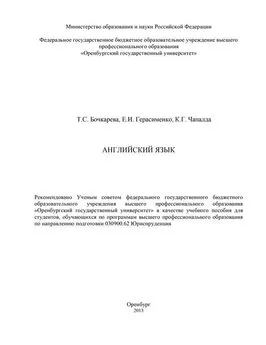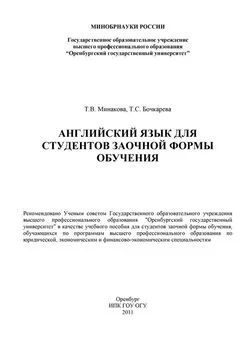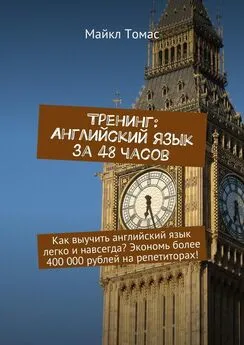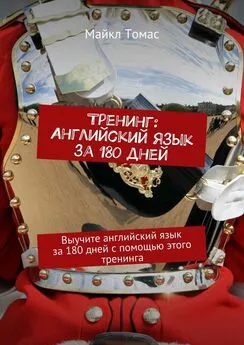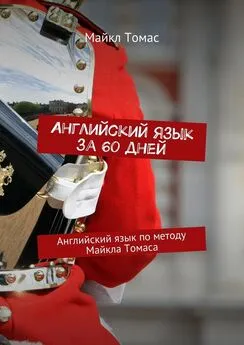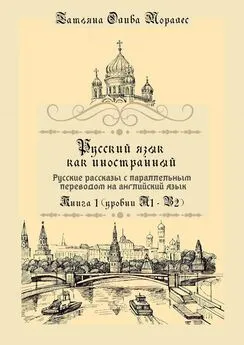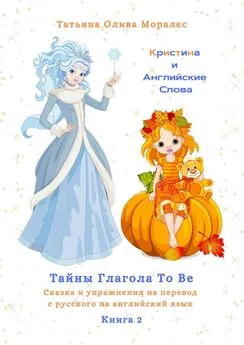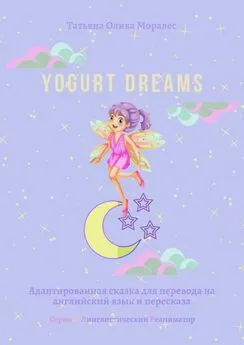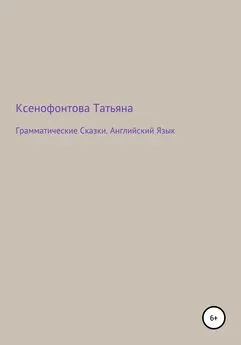Татьяна Бочкарева - Английский язык
- Название:Английский язык
- Автор:
- Жанр:
- Издательство:Литагент БИБКОМ
- Год:2013
- Город:Оренбург
- ISBN:нет данных
- Рейтинг:
- Избранное:Добавить в избранное
-
Отзывы:
-
Ваша оценка:
Татьяна Бочкарева - Английский язык краткое содержание
Английский язык - читать онлайн бесплатно ознакомительный отрывок
Интервал:
Закладка:
Examples of crimes include murder, assault, fraud and theft. In exceptional circumstances defenses can apply to specific acts, such as killing in self defense, or pleading insanity. Criminal law offences are viewed as offences against not just individual victims, but the community as well.
Contract law concerns enforceable promises, and can be summed up in the Latin phrase pacta sunt servanda (agreements must be kept). In common law jurisdictions, three key elements to the creation of a contract are necessary: offer and acceptance, consideration and the intention to create legal relations.
Tort law describes torts, sometimes called delicts, which are civil wrongs. Under the law of negligence, the most common form of tort, the injured party could potentially claim compensation for his injuries from the party responsible. Torts can also involve intentional acts, such as assault, battery or trespass.
Property law governs valuable things that people call 'theirs'. Real property, sometimes called 'real estate' refers to ownership of land and things attached to it. Personal property, refers to everything else; movable objects, such as computers, cars, jewelry, or intangible rights, such as stocks and shares. Land law forms the basis for most kinds of property law, and is the most complex. It concerns mortgages, rental agreements, licenses, covenants, easements and the statutory systems for land registration. Regulations on the use of personal property fall under intellectual property, company law, trusts and commercial law.
1.3.3 Переведите следующие слова и выражения на русский язык:
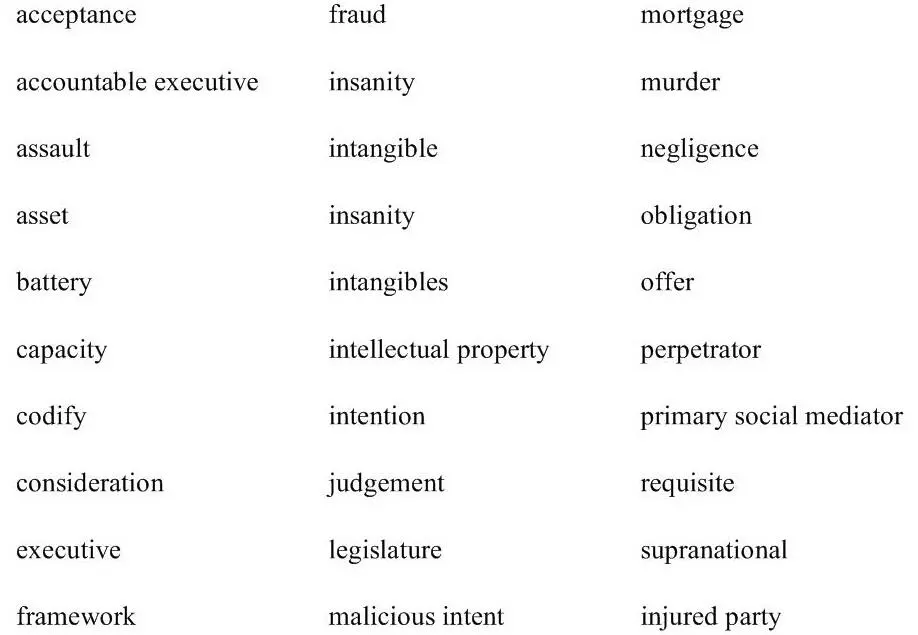
1.3.4 Прочитайте следующие утверждения и укажите, являются ли они верными:
1) Administrative law allows people to apply for judicial review of actions or decisions by local councils.
2) Constitutional law governs the affairs of the state.
3) Constitutional law is used to review the decisions of government agencies, while administrative law governs affairs between sovereign nation states.
4) Contract law can be summed up in the Latin phrase pacta sunt servanda (agreements must be kept).
5) Criminal law basically regulates the definition of and penalties for offences.
6) International law can refer to public international law, private international law or conflict of laws and the law of supranational organizations.
7) Land law governs valuable things like real property, personal property, or intangible rights.
8) Property law forms the basis for most kinds of land law, and is the most complex.
9) Tort law describes delicts, which are civil wrongs.
10) Trust law applies to assets held for investment and financial security.
1.3.5 Переведите текст со словарем.
1.3.6 Составьте 10 вопросов к тексту.
1.3.7 Выберите ключевые предложения, перескажите текст, используя выражения: «The subject of the text is…», «The text deals…», «The main idea of the text is…», «The author comments on …».
1.4 Модуль 4. Текст Prison. Types of prisons
1.4.1 Прочитайте и переведите текст.
1.4.2 Ответьте на вопросы:
1) Why are some people kept in prisons?
2) Which penalty is more effective – an imprisonment or a fine?
3) Who should be sentenced to a life imprisonment?
A prison is a place in which people are physically confined and deprived of a range of personal freedoms. Prisons are conventional institutions which form part of the criminal justice system of a country, such that imprisonment or incarceration is a legal penalty that may be imposed by the state for the commission of a crime.
A criminal suspect who has been charged with or is likely to be charged with criminal offense may be held on remand in prison if he is denied or unable to meet conditions of bail, or is unable or unwilling to post bail. A criminal defendant may also be held in prison while awaiting trial or a trial verdict. If found guilty, a defendant will be convicted and may receive a custodial sentence requiring imprisonment.
As well as convicted or suspected criminals, prisons may be used for internment of those not charged with a crime. Prisons may also be used as a tool of political repression to detain political prisoners, prisoners of conscience, and “enemies of the state”, particularly by authoritarian regimes. In times of war or conflict, prisoners of war may also be detained in prisons.
A prison system is the organizational arrangement of the provision and operation of prisons, and depending on their nature, may invoke a corrections system. Although people have been imprisoned throughout history, they have also regularly been able to perform prison escapes.
Male and female prisoners are typically kept in separate locations or separate prisons altogether. Prison accommodation, especially modern prisons in the developed world, are often divided into wings. A building holding more than one wing is known as a “hall”. Many prisons are divided into two sections, one containing prisoners before trial and the other containing convicted prisoners. Amongst the facilities that prisons may have are:
• A main entrance, which may be known as the “gatelodge” or “sally port.”
• A religious facility, which will often house chaplaincy offices and facilities for counselling of individuals or groups.
• An “education facility”, often including a library, providing adult education or continuing education opportunities.
• A gym or an exercise yard, a fenced, usually open-air-area which prisoners may use for recreational and exercise purposes.
• A healthcare facility or hospital.
• A segregation unit (also called a 'block' or “isolation cell”), used to separate unruly, dangerous, or vulnerable prisoners from the general population, also sometimes used as punishment (see solitary confinement).
• A section of vulnerable prisoners (VPs), or protective custody (PC) units, used to accommodate prisoners classified as vulnerable, such as sex offenders, former police officers, informants, and those that have gotten into debt or trouble with other prisoners.
• A section of safe cells, used to keep prisoners under constant visual observation, for example when considered at risk of suicide.
• A visiting area, where prisoners may be allowed restricted contact with relatives, friends, lawyers, or other people.
• A death row in some prisons, a section for criminals awaiting execution.
• A staff accommodation area, where staff and corrections officers live in the prison, typical of historical prisons.
• A service/facilities area housing support facilities like kitchens.
• Industrial or agricultural plants operated with convict labor.
• A recreational area containing a TV and pool table.
Prisons are normally surrounded by fencing, walls, earthworks, geographical features, or other barriers to prevent escape. Multiple barriers, concertina wire, electrified fencing, secured and defensible main gates, armed guard towers, lighting, motion sensors, dogs, and roving patrols may all also be present depending on the level of security. Remotely controlled doors, CCTV monitoring, alarms, cages, restraints, nonlethal and lethal weapons, riot-control gear and physical segregation of units and prisoners may all also be present within a prison to monitor and control the movement and activity of prisoners within the facility.
Juvenile prisons: prisons for juveniles (people under 17 or 18, depending on the jurisdiction) are known as young offender institutes or similar designation and hold minors who have been remanded into custody or serving sentence. Many countries have their own age of criminal responsibility in which children are deemed legally responsible for their actions for a crime.
Military prisons: these prisons form part of military systems, and are used variously to house prisoners of war, unlawful combatants, those whose freedom is deemed a national security risk by military or civilian authorities, and members of the military found guilty of a serious crime.
Political prisons: certain countries maintain or have in the past had a system of political prisons; arguably the gulags associated with Stalinism are best known. The definition of what is and is not a political crime and a political prison is, of course, highly controversial.
Psychiatric prisons: some psychiatric facilities have characteristics of prisons, especially when confining patients who have committed a crime and are considered dangerous. In addition, many prisons have psychiatric units dedicated to housing offenders diagnosed with a wide variety of mental disorders.
1.4.3 Переведите следующие слова и выражения на русский язык:
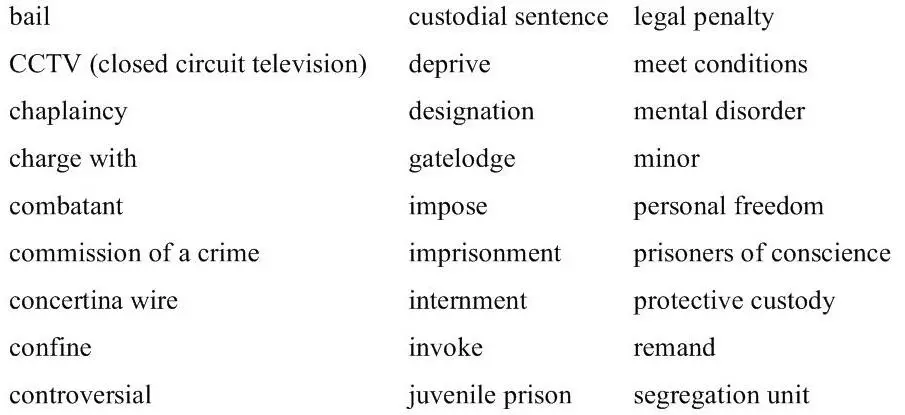
1.4.4 Прочитайте следующие утверждения и укажите, являются ли они верными:
1) Prisons are conventional institutions which form part of the administrative justice system of a country.
2) A criminal defendant may not be held in prison while awaiting a trial verdict.
3) Prisons may not be used for internment of those not charged with a crime.
4) Male and female prisoners are typically kept in separate prisons.
5) Prison accommodation is often divided into wings.
6) All prisons have a remotely controlled doors, CCTV monitoring, alarms, cages, restraints, nonlethal and lethal weapons.
7) Minor offenders’ prisons hold minors who have been remanded into custody or serving sentence.
8) Military prisons form part of criminal system, and are used variously to house prisoners of war.
9) Some psychiatric facilities have characteristics of prisons, confining patients who have committed a crime and are considered dangerous.
10) All prisons have psychiatric units dedicated to housing offenders diagnosed with a wide variety of mental disorders.
1.4.5 Переведите текст со словарем.
1.4.6 Составьте 10 вопросов к тексту.
1.4.7 Выберите ключевые предложения, перескажите текст, используя выражения: «The subject of the text is…», «The text deals…», «The main idea of the text is…», «The author comments on …».
2 Краткий грамматический справочник с тренировочными упражнениями
2.1 Артикль
Артикль – служебное слово в английском языке. Употребляется перед существительным и поясняет его. Если перед существительным стоит определяющее слова или слова, то артикль ставится перед всеми определениями. В русском языке артиклей нет и они, как правило, не переводятся на русский язык. 1 1 Видео урок, в котором рассказывается об артиклях в английском языке: http://www.lovelylanguage.ru/grammar/rules/179-articles-in-english.
Интервал:
Закладка:
